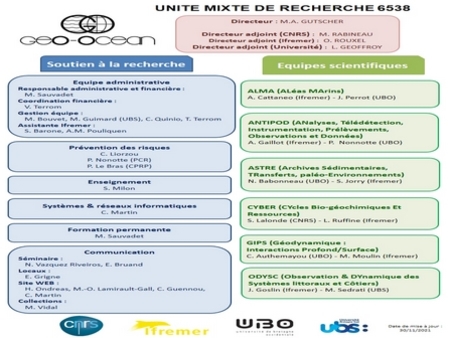Éléonore, dual course engineering student
What was your line of study?
My study path has been rather unusual. After a science-orientated baccalauréat, I studied foreign languages for three years at university. During my third year, I wanted to further explore my interest in computer science and so redirected to a university diploma in networking and telecommunications. This change in direction confirmed the fact that I wanted to further my knowledge in information science and provide myself with new professional perspectives. I then decided to pursue my education in engineering at the Institut Mines-Télécom Atlantique (IMT Atlantique), ex-School of Telecommunications, in Brittany. I am currently on a dual course at IFREMER, supervised by Carla Scalabrin, a researcher at the Laboratory of Geochemical Cycles and Resources and Jean-Marie Augustin at Underwater Acoustics and Data Processing.
What do your studies at the Laboratory of Geochemical Cycles and involve?
My subject is « Methodological and algorithmic development for the automation of acoustic data processing used in marine geosciences ». So far, all my activities have focused on facilitating the exploitation and interpretation of acoustic data and more specifically backscattered signals from targets present in the water column.
Automatic detection and characterization of acoustically observed seafloor fluid seeps (hydrothermal vents, natural and artificial gas and oil escapes) is a recent research topic and is now essential in many fields of marine geoscience such as deep-sea exploration, geological hazard studies (earthquakes, landslides) and deep sea ecosystem and marine environment monitoring.
The automatic detection of fluid-type echos is one of the major challenges of Ifremer’s CORAL project which aims at designing and producing an AUV capable of operating down to 6000 m. One of its functions would be the capacity to adjust its settings when identifying an object of interest, in this case a seafloor fluid-type echo.
My final year project is based on this programme and constitutes the preliminary stage of development of this function for the AUV. The aim is to produce a demonstrator for the automatic, real-time, reliable detection of fluid-type echos. More specifically, we shall present a tool capable of validating a real-time data processing method, tailored to the functions of the AUV.
What attracted you to Ifremer?
What initially attracted me is that Ifremer works on such an enormous variety of research. I was interested in discovering and working on multidisciplinary projects and this is exactly what I am currently doing. Even if very slightly, I already feel that I am contributing to lifting the shroud of mystery surrounding the ocean.
Do you have any hobbies?
We are lucky to enjoy a high quality of life in Plouzané, with scenic walks on the doorstep. I particularly enjoy using the well-designed cycle routes in the area and I also enjoy swimming and outdoor sports with friends.

